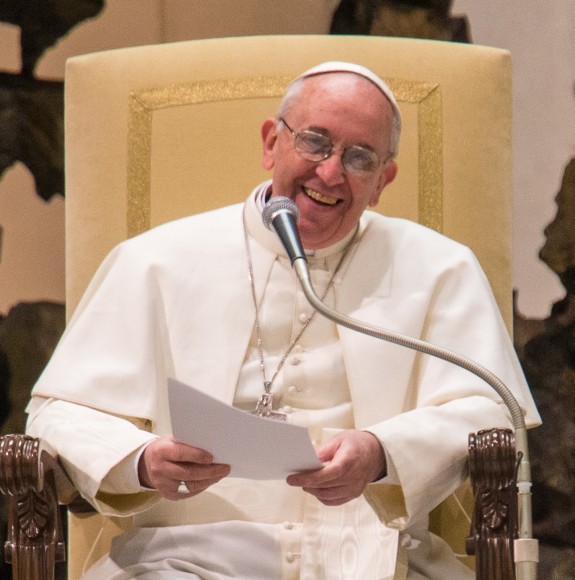From the op-ed pages of The New York Times today, this assessment from Frank Bruni:
On my vague mental list of things that might someday come back into fashion, the papacy was never present. I used to cover it for The Times, from 2002 to 2004, and was convinced then that my beat wasn’t just a dying man — John Paul could barely walk and struggled to talk — but a dying institution, at least in the United States and much of Europe.
But the bevy of bulletins from Rome and the merry nature of so many of them suggest that people everywhere, even in the more godless precincts of the Western world, can’t get enough of this new pope and are committed to giving him the benefit of the doubt. The United Nations last week issued a blistering and wholly warranted report about the Roman Catholic Church’s coddling of sexually abusive priests and its evasion of full accountability, but in none of the news coverage was Francis put on the hot seat. There was this implicit notion that the mess predated and had little to do with him, which is ridiculous: He’s been a part of this institution for a long time, and if he’d been agitating for reform and full transparency all these years, he’d never have ascended to the top.
He’s no renegade. But he is the equivalent of a corporate turnaround artist or a political strategist who deftly breathes fresh life into a sputtering enterprise. I use those secular metaphors because his rehabilitation of the papacy has so much secular resonance and so many secular lessons.
Like this: If you’re going to define yourself in opposition to a predecessor whom many people had misgivings about, go all the way. Francis is the Bill de Blasio to Benedict’s Michael Bloomberg, doing a complete semiotic overhaul. Less investment in festive footwear, more in the washing of other people’s feet. He’s not telling priests to stop being priests, any more than de Blasio is telling the police to stop being the police. He’s just urging them to tamp down the brusqueness and bullying. No more theological stop-and-frisk.
He understands that tone trumps content — that it’s everything, really. The writer Damon Linker has contributed lively, intelligent pieces of commentary to the publications The Week and The New Republic that take Francis-fawning journalists to task for seeing a revolution that’s just not there. Linker asserts that the church, under this pope, has not in fact changed its teaching about homosexuality, the ordination of women, celibacy or any of that.
And he’s absolutely correct. But he gives short shrift to what a difference a smile and a shrug make. Francis, who has mastered both, may not be telling the church’s scolds that they have to relinquish their dogma, but his manner and diction are telling everyone else that he’s not going to harangue them — that it’s neither his inclination nor his place. And that’s huge. “Who am I to judge?” he said. This, from a pope, is like Streisand saying, “Who am I to sing?” It’s a bit of self-effacement that you never saw coming.
Among the many astonishments of this pope is the realization that even when it seems everything has been said about him, again and again, journalists feel compelled to say it once more. They can’t stop writing about him, putting him on magazine covers, dissecting his statements and gauging his impact. He sells papers. More importantly, he sells an idea—a kinder, gentler Church, if you will—that has captivated the cynical secular press.
It remains to be seen where all this is leading. But it’s amazing to watch.











